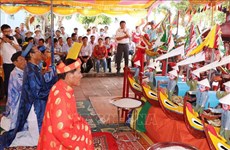Vietnam, RoK share experience, initiatives on smart city development
HCM City (VNA) – The CICON 2023 – the second international conference that combines the initials of Creative Urban, Culture, Convergence, and Industry took place in Ho Chi Minh City on June 7, offering opportunities for Vietnam and the Republic of Korea (RoK) to participate in the smart city and blockchain industry, build a network of businesses from the two countries.
The event was co-organised by Korea CEO Summit (KCS), Ho Chi Minh City Union of Business Associations (HUBA), Young Business People Association of Ho Chi Minh city (YBA HCM), and Imex Pan Pacific Group (IPPG).
Speaking at the event, Chairman of the municipal People’s Committee Phan Van Mai said that with a favourable geographical position, large population, and fast economic development, Ho Chi Minh City has full potential to develop into a smart and sustainable city.
However, to turn potential into reality, the city needs the companionship and support of international friends in different fields to create appropriate and effective solutions, he said, emphasising that the RoK is one of the important partners with rich experience in building smart cities and leading corporations.
Ho Chi Minh City aims to build a smart and modern city and Thu Duc city was selected to deploy initial solutions, through which lessons have been drawn, Mai said.
Kwon Young Gull, Chairman of the National Architectural Policy Committee under the Office of the President of the RoK, and Chairman of the Seoul Design Foundation said that Vietnam is known as a country with sustainable growth in the region with the advantages of a young population structure and potential for industrial and high-tech development.
However, like many other countries, Vietnam is encountering problems of climate change, particularly natural disasters. Quality of life and infrastructure are issues that Vietnam is currently facing, especially in big cities like Hanoi and Ho Chi Minh City.
Building a smart city does not stop at building infrastructure, but focusing on businesses that are creative and have advanced science and technology, and encouraging the connection between businesses and individuals in the public and private sectors to create synchronisation and effectively promote technological achievements, he said.
He suggested that Vietnam need to develop a strategy of "Design Vietnam" to synchronously deploy solutions for planning, appearance design, and urban quality like the way the RoK did before when building Seoul into a smart city.
Big cities like Hanoi, Da Nang, and Ho Chi Minh City need to join urban alliances in the region so that they can share and learn experience in designing and implementing smart urban models, he said./.











